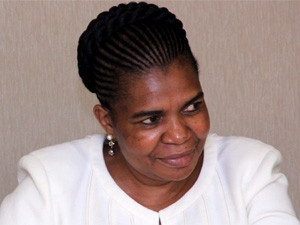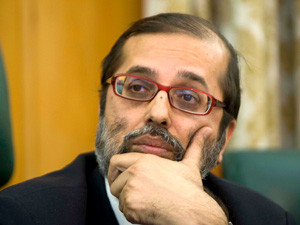
The Department of Communications' (DOC's) class of 2013 has missed the mark again this year, with instability and a lack of accountability rife among its officials, as well as a number of failed projects.
Industry observers have long criticised the key portfolio for falling short of its objectives and auditor-general (AG) Terence Nombembe's latest general report, for the 2012/13 year, reveals instability within the department is at 100%, lack of accountability and consequence management also at 100%, and slow response by DOC leadership at 67%.
Overall - despite a welcome change in leadership at the very top - the department has regressed in 2013, with the AG's assessment of risk areas revealing material findings in 83% of quality of performance reports, 50% of supply chain management, and 60% in the quality of submitted financial statements.
Much of the cloud hanging over the department has been attributed to ousted communications minister Dina Pule, who was summarily dismissed by president Jacob Zuma during a Cabinet reshuffle in July after months of scandal and allegations of cronyism and corruption.
And although her replacement, Yunus Carrim, brought with him new hope and energy, half a year proved to be too short a period to action sufficient improvement, although industry observers have commended his determination and direction.
Weak and divided
Carrim himself has labelled the DOC as "relatively weak and divided". He said recently there was "an inclination among the senior managers to settle old scores and create new spaces for influence in the current period".
He has devised a six-tier strategy to improve the department's performance and public image, which he plans to implement before the elections next year. The objectives of the strategy include filling vacant posts with skilled individuals, defragmenting the ICT sector, improving service delivery and finalising the ICT Policy Review.
Further to that, Carrim says the department is reviewing its Annual Performance Plan (APP) and setting "realistic and realisable targets". In August, the new minister said certain key aspects of the APP would be prioritised and, where possible, fast-tracked "to the extent possible in difficult circumstances".

The APP entails the development of an effective spectrum policy, further reducing the cost to communicate, beginning the rollout of digital migration and a greater focus on rural and underserviced areas - among others.
But Carrim has a tall order as head of the embattled department, with many issues and projects left undone by his predecessor - and industry observers have by and large taken a "time will tell" approach.
Grading the leaders
The Democratic Alliance's (DA's) shadow minister of communications, Marian Shinn, who gives Pule an 'F' and Carrim a considerably better - but average - 'C', says the DOC is beset with a litany of failures. The DA last year this time scored Pule just one notch higher than the fail Shinn attributes.
Apart from dithering in allocating much-needed spectrum to SA's telecoms players, Shinn says "the perpetual revision of the broadband policy" is another obstacle in the way of progress.
"[Then there is] the delay in getting the ICT Policy Review started - it only got off the ground earlier this year after being announced in March 2012."
She also mentions the DOC's failure to pull the SA Broadcasting Corporation (SABC) into line, saying the state-owned broadcaster's performance was worse this year than last. "Ditto the Universal Service Access Agency of South Africa."
Shinn says the DA downgraded Pule to a rock-bottom 'F' this year because she was a laggard in answering Parliamentary questions, failed to finalise the performance contract with DG Rosey Sekese, failed to hold the SABC board chairman Ben Ngubane to account, and failed to drive the investigations and prosecutions of SABC staff by the special investigating unit.
"I've ranked Carrim as a 'C' [because] he has been exceptionally busy and pushing stuff through - such as filling staff vacancies and being decisive on the complex and fractious set-top box access control system."
Shinn says, however, her concern is that, in Carrim's rush to tick off the various targets that will score points for the election; some of his decisions may be ill-considered.
"Has he populated the staff complement with suitably qualified people, or has he just put bums on seats - only time will tell. Let's hope his tenure doesn't turn out to be a hit and run affair."
Unfinished business
At the time of Carrim's appointment, MD of World Wide Worx, Arthur Goldstuck, said Pule's exit from the DOC left behind a trail of unfinished business.
"The moment a reshuffle was hinted at, it was almost a foregone conclusion that Pule would be given the boot. There is just too much hanging over her for any commitment to cause or friendship to save her. The only way she could have kept her job would have been if there was no Cabinet reshuffle."
Goldstuck says Pule failed the sector from a number of perspectives, including myriad scandals and lack of action. He cites delays in rolling out digital terrestrial television (DTT), the implementation of local loop unbundling, and the "watering down" of the National Broadband Policy framework as some of the areas in which Pule has bombed out.
"Pule essentially took SA's broadband policy and turned it into something more futile than it was in the first place. The previous policy framework, under [former communications minister] Siphiwe Nyanda, set the bar so low that it was meaningless. Then Pule came in and removed the definition of universal access. The moment that framework saw the light of day it was obvious [Pule] had no idea about what universal access [to broadband] meant.
"There is almost nothing you can say Pule made progress in."
Transformation
Dominic Cull, Internet Service Providers' Association (ISPA) regulatory advisor, says the performance of the ministry and DOC during 2013 has been one of two contrasting halves.
He says Pule did very little to address long-standing policy inadequacies and appeared averse to making decisions related to her portfolio. "Her failure to finalise a draft policy direction on high-demand and digital dividend spectrum - effectively stopping ICASA from moving forward to license this spectrum - is perhaps the stand-out example of the frustration caused to industry and the damage to SA's economy during her tenure."
Cull says Carrim's appointment, however, brought with it transformation. "[Carrim's] work ethic seems contagious and ISPA can only applaud the real progress that has resulted, with the National Broadband Policy recently approved by Cabinet being a key output - an exponential improvement on the previous version.
"Carrim has identified addressing the capacity and delivery shortcomings of the department as being his top priority and there are positive signs of an enabling policy environment being created."
Implementation will be key in 2014, says Cull - who grades Pule a 'G' and Carrim a "well-deserved" 'A'.
The DA is expected to release its annual performance report, which rates government's performance by department, next week.
The DOC was not immediately available for comment.
Share